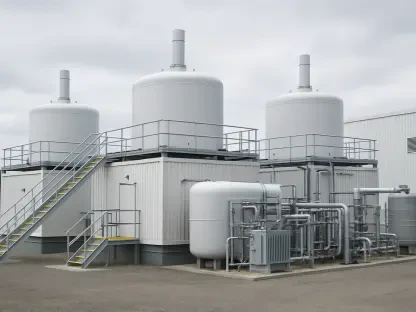In a world where buildings account for nearly 40% of the European Union’s total energy consumption and a similar share of global CO2 emissions, the urgency to address energy inefficiency has never been more critical. Despite this staggering statistic, around 75% of buildings remain inefficient, contributing to environmental degradation and straining energy grids. Enter Bisly, an Estonian innovator in smart building automation, which has recently secured €4.3 million in funding to tackle this pressing issue head-on. By leveraging cutting-edge AI technology, Bisly is not only addressing a significant source of emissions but also paving the way for a more sustainable future across key European markets. This remarkable development signals a shift in how the building sector can contribute to climate goals while meeting economic and regulatory demands, making Bisly a company to watch in the realm of energy-efficient innovation.
Tackling Energy Inefficiency with AI Innovation
Harnessing Digital Twin Technology for Optimization
Bisly’s approach to building automation stands out through its patented digital twin technology, a virtual model of a building that uses real-time data to optimize energy consumption and indoor environments. This system continuously adapts to changing conditions, ensuring that heating, ventilation, and lighting operate at peak efficiency. Unlike traditional systems that often require costly overhauls, Bisly’s cloud-based platform integrates seamlessly with third-party devices, avoiding vendor lock-in and offering unmatched flexibility to developers and property managers. This adaptability is particularly crucial for both new constructions and older buildings, where retrofitting has historically been a challenge. By reducing operational costs by up to 50% compared to legacy solutions, Bisly makes smart technology accessible to a wider audience, addressing a critical gap in the market where affordability has often hindered the adoption of energy-efficient systems.
Meeting Climate Goals with Cost-Effective Solutions
Beyond technological innovation, Bisly’s impact on the climate crisis is profound, as emphasized by CEO Ants Vill, who highlights the dual benefit of environmental conservation and freeing up grid capacity for emerging needs like AI data centers and electric vehicle adoption. A compelling statistic underscores this impact: each ton of CO2 avoided through Bisly’s technology is up to six times more cost-effective than equivalent reductions achieved through transport electrification. This efficiency positions building automation as a pragmatic and impactful response to global sustainability challenges. By focusing on the built environment, which represents a massive portion of energy use, Bisly is helping to alleviate pressure on energy grids while supporting broader ecological objectives. The company’s solutions are not just about cutting costs but also about creating a scalable model for reducing emissions across diverse property types, from residential complexes to commercial spaces.
Strategic Growth and Market Expansion in Europe
Dominating the Estonian Market and Beyond
Bisly has already established a strong foothold in Estonia, where its systems are installed in the majority of new residential apartments sold this year, showcasing significant market traction. This success is bolstered by strategic partnerships with prominent developers such as Endover, Liven, Bonava, and Pro Kapital, whose collaboration has been instrumental in refining Bisly’s offerings to meet high standards of reliability and affordability. These alliances have provided valuable feedback, enabling continuous improvement of the platform to cater to diverse needs. With a portfolio spanning residential and commercial properties, Bisly’s dominance in its home market serves as a springboard for broader European ambitions. The company’s financial growth, having tripled its core revenue last year with projections for similar gains moving forward, reflects the scalability and acceptance of its innovative solutions in a competitive landscape.
Expanding Footprint with Targeted Regional Strategies
The recent €4.3 million funding round, led by 2C Ventures and supported by investors like Aconterra and SmartCap’s Green Fund, is fueling Bisly’s go-to-market strategies in key regions such as the DACH area (Germany, Austria, Switzerland), the UK, and Poland. This capital injection is facilitating the establishment of a new office in Warsaw, tapping into one of the fastest-growing markets for smart building technology. With existing offices in Tallinn, London, and Berlin, Bisly is also expanding its engineering team to develop a wireless product line tailored for retrofitting older structures, significantly broadening its applicability. The appointment of a Polish-speaking Head of Demand Generation ahead of the Warsaw opening demonstrates a thoughtful, localized approach to expansion. This strategic focus on regional needs, combined with investor confidence in digital innovation’s role in reducing the building sector’s carbon footprint, positions Bisly as a leader in transforming Europe’s built environment.
Reflecting on a Sustainable Legacy
Looking back, Bisly has carved a notable path in the smart building automation landscape by addressing one of the most significant contributors to energy consumption and emissions with affordable, AI-driven solutions. The successful funding round and robust market presence in Estonia, alongside strategic partnerships across Europe, underscore its potential for widespread impact. By pioneering tools like digital twin technology and slashing operational costs, Bisly not only advances environmental goals but also supports the growing demands on energy grids. Moving forward, stakeholders can take inspiration by investing in scalable energy management systems and advocating for policies that incentivize retrofitting inefficient buildings. As the sector evolves, exploring collaborations with tech innovators and aligning with regional sustainability targets will be crucial steps in building on this momentum for a greener, more efficient future.









